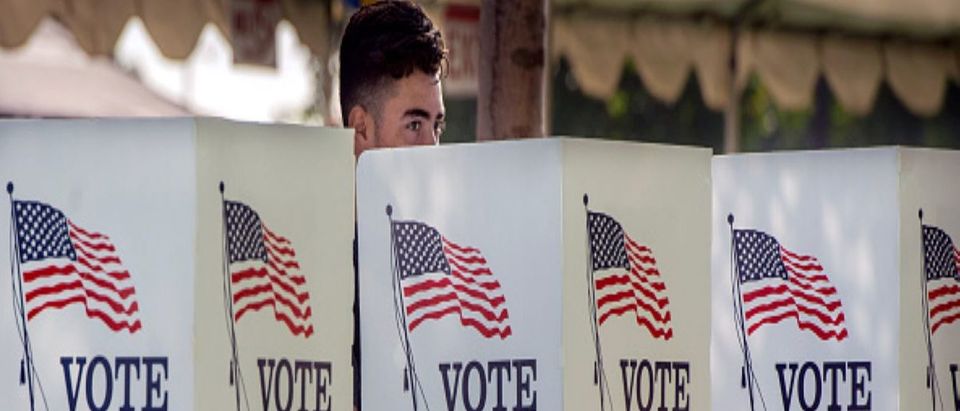One of the few optimistic takeaways from former Special Counsel Robert Mueller’s testimony on Capitol Hill was that something could be done to thwart Russian attempts to meddle in American elections next year. That effort requires more than criticizing the Trump administration for its supposed softness on Russia or cheering on proposals that sound good but have unintended negative consequences.
There are two bills currently before Congress touted as ways to use economic pressure to punish and deter Russian from hacking our country’s electoral system. However, both would ultimately undermine U.S. commercial and economic interests and likely upend progress the Trump administration has made in crafting a comprehensive response to a host of Russian geopolitical infractions. Such legislation sets up a false choice between safeguarding our election integrity and our economic interests.
If enacted, both the Defending American Security from Kremlin Aggression Act of 2019 (DASKAA) and the Defending Elections from Threats by Establishing Redlines Act of 2019 (DETER) would reduce American leverage abroad and enable geostrategic rivals’ commercial activity to the region to fill the vacuum left by America’s absence.
Specifically, these pieces of legislation would likely restrict American business development in Eastern Europe. More broadly, global markets in oil, gas and refined products could be disrupted and U.S companies could be forced to exit joint projects. Meanwhile, new sanctions on Russian sovereign debt, a DASKAA target, could undermine the role of the dollar as the premiere global trading currency. This would provide an opening for emerging currencies such as the Chinese yuan to take its place.
Using economic tools to punish and deter bad actors has long been part of U.S. policy, but this strategy works best when done in concert with other countries or when carefully targeted. In that regard, the Administration and Congress have moved rapidly and thoughtfully to dissuade future election meddling, punish bad actors, and harden election defenses.
Two years ago, the Countering America’s Adversaries through Sanctions Act (CAATSA) became law. The legislation sanctioned Russia for its continued offensive military involvement in Ukraine and Syria, as well as for election interference in 2016.
Since then, 39 Russian defense and intelligence-related entities were expelled from the United States. In March 2017, the president signed an executive order, pursuant to CAATSA, that blocked certain persons from conducting malicious cyber-enabled activities and further sanctioned Russian individuals and entities for interfering in U.S. elections. Last year, 13 Russians were indicted by the Department of Justice for cybercrimes against the United States. Simultaneously, the department imposed sanctions on a number of Russian oligarchs, freezing their U.S. assets and forbidding U.S. persons and companies from conducting business with them.
Meanwhile on other geopolitical issues, President Trump approved the sale of $47 million worth of anti-tank missiles to Ukraine to combat Russian-backed separatists, participated in joint military exercises with Ukrainian forces, and conducted naval maneuvers with NATO in the Black Sea near Russia’s sensitive naval base at Sevastopol. In addition, late last year, American Special Forces operators directly engaged pro-Syrian military forces that were largely comprised of Russian mercenaries, marking one of the first kinetic engagements between the US military and Russian nationals in recent times.
These actions discredit assertions the Trump administration is not being tough enough with Russia and highlights the fact that the job of protecting our elections requires the utilization of multiple tools in our arsenal, such as increasing funding to bolster our election infrastructure at the state and local level. This would be an effective step toward solidifying our defenses against cyber intrusions and election meddling. It is something we can and must do unilaterally.
With economic sanctions, however, our leaders must carefully weigh the consequences for U.S. interests. In 2000, I was involved in the easing of trade restrictions on food and medicine with Cuba that had been in place for 40 years. This benefitted American farmers, producers and manufacturers, allowing them to compete against their international counterparts who had long been benefitting from access to Cuba’s market. Only in the face of evidence of Cuba’s continued anti-U.S. actions did the Trump administration recently impose new travel restrictions with Cuba. Likewise, with Russia U.S. policy should deter election disruption with minimal impact on American economic interests.
As 2020 approaches, the job of protecting our elections is far from complete. Baseless rhetoric about President Trump’s inaction with Russia or enacting wide-reaching laws that would cut U.S. companies out of global economic opportunities will not get the job done. We need state-of-the-art technology, adequate election security resources at the state and local level, as well as cooperation with policymakers and technical experts.
Complex problems often require complex solutions, and our elected leaders must take into account the strides we’ve made as a nation to reinforce our electoral defenses, and consider the impacts of our decisions moving forward.
George Nethercutt served as a Republican representing Washington in the House of Representatives from 1995-2005. He is chairman of Nethercutt Consulting and of the George Nethercutt Civics Foundation.
The views and opinions expressed in this commentary are those of the author and do not reflect the official position of The Daily Caller.


